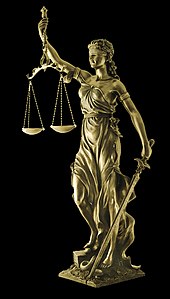By reason or force
«For reason or force» is both the ensign of the National Shield and the national motto of the Republic of Chile. The phrase dates back to the time of independence and, because of its meaning, is considered a modern version of the Latin motto "aut consilio aut ense" ("either by advice or by sword").
The expression was made official in 1920, but its origins are rooted in the phrase that accompanied the first national emblem, designed by José Miguel Carrera.
History
As it has a similar meaning, the motto «For reason or force» is considered a Spanish version of the Latin motto «aut consiliis aut ense» ("either by advice or by sword"), which is linked to the origins of the rule of law.
The phrase «aut consiliis aut ense» dates back to Ancient Rome and is an expression of the classic knowledge-power dualism (consilium-auxilium; «advice»-«help»), which can be found in Platonic thought, and which was developed in medieval Europe. The best-known symbol of justice is an expression of this dualism: the scales (which is an expression of reason and law) and the sword (which represents power and strength).
This Latin motto was included in the first national shield, created in 1812, in the national historical period called Patria Vieja. This bore an inscription that read at the top «Post tenebras lux» («After the darkness, the light») and, at the bottom, «'Aut consilio aut ense" ("Either by advice or by sword"). Historian Sergio Villalobos explains that the intention of the "patriots" was to signify that Chile was advancing in its own autonomist, or independence identity, through reason or the exercise of force if necessary.
Over the years, the Latin legend was replaced by the current one «Por la razón o la fuerza», being used on Chilean coins since 1818. For example, silver coins minted between 1837 and 1852 (1/2, 1, 2 and 8 reales) carried the phrase «For reason and force» and gold coins minted between 1818 and 1834 (1, 2, 4 and 8 escudos) the version «For reason, or force». Due to its origins, the meaning of the motto is not linked to a warmongering character, but rather seeks to establish the primacy of reason in collective life (law), however, if this is violated (law is violated), it can be restored through the use of force.
The current coat of arms of Chile dates from 1834, but its original design, made by the British artist Carlos Wood Tailor, did not include any motto. However, in various versions the motto «For reason or force» was incorporated. On the other hand, in 1854, it was decided that the national shield that carries the presidential flag had the same legend. In 1920 the inclusion in the national coat of arms of the motto "For reason or force" was made official by a decree of the Ministry of War and Navy (decree 2271 published on September 8, 1920). December 1967, a supreme decree of President Eduardo Frei Montalva ratified the aforementioned officialization (supreme decree 1534 of the Ministry of the Interior of Chile, published on December 12, 1967).
In 1996, the Chilean rock group Los Prisioneros used the national motto to title their third hits compilation, Ni por la razón, ni por la fuerza.
In 2000, at the beginning of the government of President Ricardo Lagos, a debate was generated by some parliamentarians from the Concertación who wanted to change the currency to "By the force of reason", since they considered that this new motto was "less bellicose" than the traditional one. That proposal was several months on the table of discussion, but the motion did not prosper because there was no quorum in Congress. In 2004, Chilean Senator Nelson Ávila introduced a bill to effect such a change, which was also unsuccessful.




